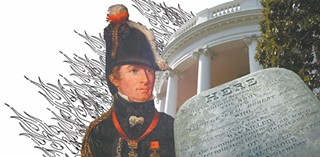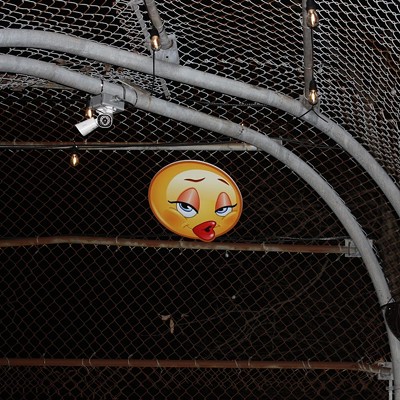Halifax, Nova Scotia, Canada Spring 2005
Finally, the gates to the Old Burial Ground on Barrington Street are open. Just inside, there's a map showing who's buried where, so it takes just two minutes to find him. He's got a box grave—one of those above-ground concrete boxes about the size of a coffin. It's a big one, maybe the biggest here, so I have to climb on top of it to read the inscription. It says:
This is the fellow who burned down the White House. He is, I admit, a bitterly sarcastic interest on my part, borne of my utter contempt for the present occupant of the White House. I wouldn't advocate actually burning down the White House—suggesting as much would likely be a violation of the Patriot Act and worthy of secret rendition to Guantanamo, even for me, an American citizen—but having a little fun with the historical reality of the event surely harms no one.
I chuckle, but catch myself: Should I really be laughing about a war? Maybe I should find out more about this Ross fellow.
Searcy, Arkansas, United States 2 November 2004
The White County Courthouse is packed full of politicians, their families and well-wishers, election officials and interested hanger-ons. I'm here as a reporter for the local daily newspaper. The paper has two sports reporters, but I cover everything else that happens in this rural county at the very buckle of the Bible Belt: government affairs, car accidents, happenings at the local fundamentalist Christian college, and whatever else I can pass as newsworthy.
Every officeholder in the county is up for re-election, so it's taking many hours to count the votes. I busy myself reflecting on my stay here.
There's a crazy jingoism in the American heartland, intensified by an equally crazy brand of Christianity. There's no mistaking that this is a country at war—I'm reminded by flags on every business, ribbons on every car. More, the Arkansas economy has always struggled, and many people had joined the National Guard to make ends meet. Those people are now in Iraq, and their families and communities are celebrating them—"Support the troops!" is the call of the day, and there is absolutely no room for questioning the war.
But it's only a matter of degree that separates Arkansas from California, which I used to call home. Over the last 15 years Americans everywhere have been whipped into war fever. Millions marched against starting the Gulf War, but once it began, dissidents were mostly cowed into silence. September 11 ratcheted up the insanity, leading to popular support for launching an aggressive war against Iraq, a country that had done America no harm. It is, in truth, a War on Muslims. Just any Muslims, doesn't matter who or where.
Maybe the craziness will pass. The 2000 election, which gave George W. Bush the presidency, was unquestioningly stolen. But two years into this war, people now know what's at stake, and voter turnout is the highest in decades.
Alas, no. Not only does Bush win re-election, he wins big. America is still insane.
I head back to the newspaper office to write up election results, hand in my copy. Tomorrow, I'll quit my job. Within a month, I'll be living in Canada.
Washington, DC, United States 24 August 1814
The War of 1812 is a war of American aggression. Sure, the Americans are upset about the impressment of American sailors into the British navy. But the move for war is urged on by "war hawks" of the Great Lakes area, who are upset at British military support for Indian nations defending themselves against waves of American settlers. Other Americans have even greater territorial ambitions—conquering Canada, Thomas Jefferson says, is "a mere matter of marching." So, with Britain's army bogged down in Europe, the Americans pounce. They terrorize Upper Canada, burning the town of York (now Toronto).
In retaliation, the British navy has been terrorizing towns up and down the Chesapeake Bay, but with the defeat of Napoleon, army troops can now join the fight. Major General Robert Ross, still recovering from wounds received in a celebrated Iberian campaign, is rushed across the ocean aboard the HMS Royal Oak to lead the attack.
Ross marches an army of 4,500 men through southern Maryland and meets 9,000 American troops at the town of Bladensburg, but the battle-hardened Brits have no problem defeating them. In future centuries this little battle will be laughed off as an example of American military incompetence, but the matter isn't so funny to the 90 people killed in the action.
Regardless, Ross is free to move on the American capital unopposed. Dolley Madison, the president's wife, gathers up potentially loot-able goods of the presidential mansion—the silver, a painting of George Washington—and flees just as Ross enters town.
As night falls, Ross sets fire to the public buildings of the capital but orders his men to respect private property. He can't, however, control the home-grown looters who quickly take advantage of the situation to take what they can, from where they can. Oddly,
America will never learn that looting is a natural consequence of the collapse of civic order.
Those people of the future will hold arcane debates about unimportant matters: Did the British troops really help themselves to a presidential feast before burning down the mansion? (Yes.) Was the building really re-named the White House because its fire-charred walls were later painted white? (No.) The truly important questions, however, will not be asked, much less answered: How many people died or were injured in the attack? How many refugees fled the city, and what tribulations did they suffer?
Admiral Alexander Cochrane, who has been merrily torching towns up and down the bay, criticizes Ross for not wreaking enough destruction. Likewise, back in England, Lord Bathurst learns of the attack and fires off a letter to Ross urging an intensified level of shock and awe. "If you should attack Baltimore," writes Bathurst, "make its inhabitants feel a little more of the effects of your visit than what they have experienced at Washington."
But Harry Smith, a member of Ross' staff, thinks otherwise. "We entered Washington for the barbarous purpose of destroying the city," he writes. "I had no objection to burn arsenals, dockyards, frigates building, stores, barracks, etc., but...we were horrified at the order to burn the elegant Houses of Parliament and the President's house...with the ruthless firebrand of the Red Savages of the woods."
Halifax, Nova Scotia, Canada 26 January 2006
As a joke, my partner and I eat popcorn and drink beer while we watch the Canadian federal election returns on televison.
I should stress that I didn't come to Canada as an embittered American political refugee. Rather, my partner, Canadian born and bred, was offered a job in Halifax, and we decided for a variety of personal and career reasons to make the move together. The juxtaposition with Bush's re-election was happy happenstance.
But there's no sense living somewhere without being an actively involved member of society. I applied for my permanent residency as soon as I could pull the paperwork together, and have every intention of becoming a Canadian citizen as soon as I meet the requirements.
A couple of months ago people began wearing red poppies on their lapels in remembrance of World War I, perhaps the most senseless and stupid mass slaughtering in human history. While I respect that Canada wants to honour those lost in service to country, I'm uneasy with Canada's participation in America's War on Muslims, so it's with mixed feelings I attend the ceremony at the Dartmouth Cenotaph. Still, there's a moving solemnity about the ceremony that makes me understand that Canada approaches these things in the right manner. I feel good about it.
Until, that is, the band strikes up and the crowd begins singing "Onward, Christian Soldiers." In the context of Canadian troops serving in Afghanistan, do those gathered not understand the meaning of what they're singing? Is Canada going crazy too?
The election returns roll in. The Conservatives win big in Quebec and suburban Toronto. Paul Martin concedes just after midnight. Stephen Harper will form the government.
"If I wanted a right-wing, war-mongering government," I say to my partner, "I would have stayed in the States."
Near Baltimore, Maryland, United States 12 & 13 September 1814
Ross leads his troops for an attack on Baltimore. But as he rounds a bend in the road he encounters a small American advance team. Two riflemen, Daniel Wells and Henry McComas, are credited with firing the single shot that passes through Ross' right arm and lodges in his chest.
The HMS Tonnant will carry Ross' body back to Halifax, the nearest British port. Perhaps the body is placed in a keg of rum for transport—that's a common enough practice, but other fallen soldiers in this war aren't so handled. Despite no hard evidence one way or the other, the future will treat Ross' rum-soaked body as fact.
"The death of General Ross," writes a British officer present for the siege of Baltimore, "seemed to have disorganised the whole plan of proceedings, and the fleet and army rested idle, like a watch without its mainspring."
Admiral Cochrane begins a 25-hour bombardment of Fort McHenry, an effort to "soften up" American defenses and allow reinforcements to reach the army. The effort fails, and Fort McHenry holds. Baltimore is saved.
Francis Scott Key watches the battle from a ship in the harbour, and composes a poem, The Defence of Ft. McHenry, to the tune of a drinking song. The song will eventually become known as The Star-Spangled Banner, and will be adopted as the American national anthem.
Key speaks of the rockets' red glare and the flag that's still there, but of the 610 dead, there's not a word.
Chico, California, United States January 1991
I join about 200 others in this small college town for an anti-war demonstration along the street in front of the Army recruiting offices, the best local symbol of the American military we could find. Hundreds of other such protests are being held across America, hoping to dissuade President George HW Bush from launching an attack on Iraq.
We carry signs, march back and forth peacefully. The cops come out to take a look, but leave us alone. Suddenly a car stops, mid-block, immediately in front of me. Cars whip by, honking annoyance at the stopped car. A woman pops the trunk, steps out of the driver's seat. She walks to the trunk and grabs something about a metre long.
"A rifle?" I think. No, she unfurls an American flag, and marches in the street, in front of us. "God Bless America!" she yells, repeatedly.
The cops come and remove her. She's impeding traffic.
In coming weeks a US-led coalition will force Iraqi troops to withdraw from Kuwait. Thousands of Iraqi soldiers will be killed from the air while retreating along what will famously be called the Highway of Death. Hundreds more, mostly teenagers forced into the army, will be bulldozed alive beneath the desert sands. Water and sewage plants will lie in ruins and, as a result of economic sanctions, over the next decade a half-million Iraqi civilians will die from disease and malnutrition.
Halifax, British Colony of Nova Scotia 29 September 1814
The press gangs wander about, seizing layabouts and drunks in the taverns and brothels, but for the respectable sort, business is good: hundreds of military ships need provisioning, and wily middlemen find markets for loot plundered by the privateers.
Less lucky are the 10,000 prisoners of war—first French, now American—who have travelled through the prison camp at Melville Island. The hellhole prison camps of the US Civil War have yet to be invented, but things are bad enough here, and some 400 people die.
Today, Ross' body arrives at King's Wharf. A military parade to the cemetery ensues: soldiers four abreast, then sailors, followed next by officers in full dress, the coffin and a riderless horse, symbolizing the lost hero. Military bands play martial music—"Onward Christian Soldiers" won't be written until 1871, by an American—and the coffin is lowered. Ross' sword is broken, tossed in the grave.
In contrast, the dead at Melville are rowed over to Target Hill and unceremoniously dumped in shallow graves. For the next 150 years souvenir hunters will collect the skeletal parts that happen to pop out of what will be called Deadman's Island. They are otherwise forgotten, until the post-9/11 fetishization of American war dead catches up with them. A monument will be built, listing each American (but none of the French) by name.
Halifax, Nova Scotia, Canada Fall 2006
One sunny day in October I drop by the Immigration Canada office on Brunswick. "You'll be my easiest case all day," the immigration officer tells me as he stamps my passport. I'm now a permanent resident of Canada.
But as the year progresses, Canada is in some ways starting to feel like America: the "peacekeeping" mission in Afghanistan is increasingly called a "war." Stephen Harper, who has taken to saying "God Bless Canada," says that there can be no debate about Canada's involvement in Afghanistan. "It is not the intention of this government to start to question that mission when our troops are in danger," he says. "To do so would...be a betrayal of the brave men and women we have in the field who are in danger."
By Remembrance Day, the Battle of Vimy Ridge is celebrated as a Canadian baptism by fire, the message being that Canada was born of blood, not negotiation, as I had learned in my three years of study.
"You can't support the troops without supporting their mission," a caller, echoing Harper, tells a CBC radio show about Afghanistan.
The statement rankles. I don't wish anyone ill, but my first reaction is to ask: Which troops? Am I to support the troops that burned down the White House, or those gunned down at Bladensburg? Do I support the Canadian troops that tortured a Somali teenager to death? The American troops at Abu Ghraib?
But, the son of a career military man, I know better. Like everyone else, soldiers may or may not be decent people individually, but they are always political pawns, and this is no different. "Support the troops, regardless," is the ultimate insult to those serving a democratic nation.
Halifax, Nova Scotia, Canada 1 July 2007
The American War on Muslim People is going badly. Nearly a million Iraqis have died prematurely, but evidently no one cares about them. It's the 3,000 or so American troops who have died that have turned the American public against George W Bush.
Still, I've seen Americans gleefully whipped into war fever, time and again. It's nice they've come around, four years into this war, but how can anyone, anywhere, trust Americans again?
As for Canada, I've discovered that nothing is black and white. I groove on the ambiguity: life is truly more interesting in Canada, as people look at things from a hundred directions at once and come to a usually sensible course of action that itself won't be etched in stone. So, maybe that sensible Canada I've come to love will prevail.
But increasingly people are drawing lines in the American fashion. We must "support the troops," meaning support whatever war the politicians send them to, no questions asked.
With those thoughts in my head, I'll head down to the waterfront to watch the Canada Day fireworks, and I'll worry: O, Canada.
Tim Bousquet is a freelance writer. For help in researching Robert Ross, he’d like to thank: Jeanne Howell, librarian at the Cambridge Military Library; Dan Conlin, curator of Marine History at the Maritime Museum of the Atlantic; Chris George, author of Terror on the Chesapeake; and Philip Hartling, deputy archivist at the Public Archives of Nova Scotia. Also, John Boileau’s Half-Hearted Enemies was useful.














